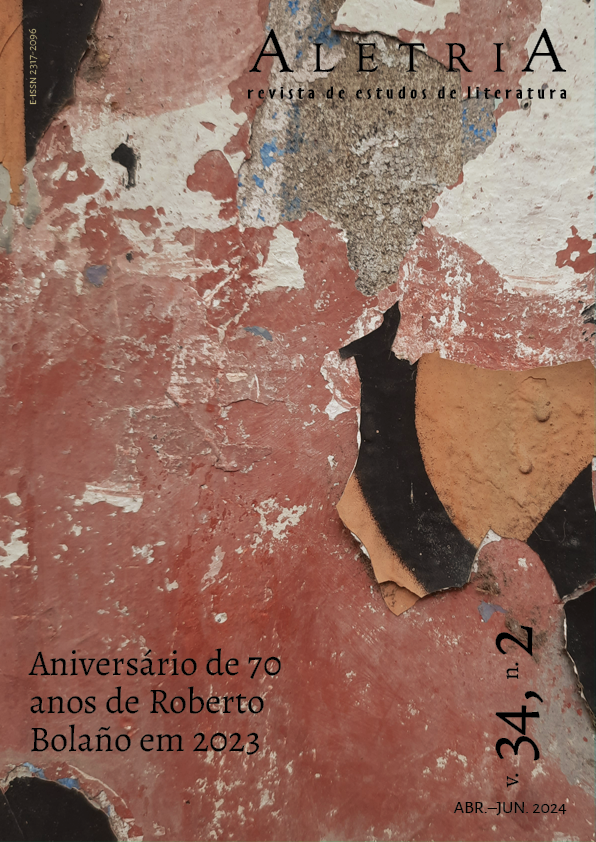An eye in the face of violence
trauma, castration and exile in “O Olho Silva”, by Roberto Bolaño
Keywords:
Roberto Bolaño, violence, trauma, dictatorship, exile, Latin America, Comparative LiteratureAbstract
This present work seeks to read the short story “O Olho Silva”, by Roberto Bolaño, published in the collection Putas Asesinas (2001). From Ricardo Piglia’s theoretical perspective on the form of the report and the short story as a genre, there is a discussion of central themes of the narrative, recurring throughout the Chilean writer’s production, such as: violence, exile, trauma provided by Latin American dictatorial regimes during the 20th century and its consequences on the generation that experienced it. The perspective of authors such as Edward Said and Susan Sontag is also relevant for thinking about specific issues that are associated with the themes exposed.
Downloads
References
ALVES, Wanderlan. Orfandade, movimento, presença: Sobre uma ética da literatura em Putas asesinas, de Roberto Bolaño. In: Revista Criação & Crítica, n. 21, p. 127-146, 2018. DOI: https://doi.org/10.11606/issn.1984-1124.v0i21p127-146.
AVELAR, Idelber. Alegorias da derrota: a ficção pós-ditatorial e o trabalho de luto na América Latina. Tradução Saulo Gouveia. Belo Horizonte: Editora UFMG, 2003.
BOLAÑO, Roberto. Putas assassinas. Tradução de Eduardo Brandão. São Paulo: Companhia das Letras, 2017, edição digital.
BOLAÑO, Roberto. A universidade desconhecida. Tradução de Josely Vianna Baptista. São Paulo: Companhia das Letras, 2021.
CALVINO, Italo. Seis propostas para o próximo milênio. Tradução Ivo Barroso. São Paulo: Companhia das Letras, 1993.
CORNEJO, Marcela et al. Historias de la dictadura militar chilena desde voces generacionales. Psykhe (Santiago), v. 22, n. 2, p. 49-65, 2013. DOI: http://dx.doi.org/10.7764/psykhe.22.2.603.
DALLENBACH, Lucien. Intertexto e autotexto. In: Intertextualidades. Tradução de Clara Crabbé Rocha. Coimbra: Almedina, 1979. p. 51-76.
DALLENBACH, Lucien. Le recit spéculaire: essai sur la mise en abyme. Paris: Seuil, 1977.
ECHEVARRÍA, Ignacio. Bolaño extraterritorial. In: Bolaño salvaje. Barcelona: Editorial Candaya, 2008.
FELIPPE, R F D. Ilegitimidades na ficção de Roberto Bolaño: os filhos da outra. In: Boletim de pesquisa nelic, Florianópolis, v. 14, n. 21, p. 82-92, 2014. Disponível em: http://dx.doi.org/10.5007/1984-784X.2014v14n21p82. Acesso em: 03 abr. 2024.
GINZBURG, Jaime. El Ojo Silva, de Roberto Bolaño. In: OLINTO, Heidrun Krieger; SCHØLLHAMMER, Karl Erik (org.). Cenários contemporâneos da escrita. Rio de Janeiro: 7 Letras, 2013. p. 102-114.
HOBSBAWM, Eric. Chile: ano um. In: Viva la revolución: A era das utopias na América Latina. São Paulo: Companhia das Letras, 2017. p. 415-445.
JAMESON, Fredric. A lógica cultural do capitalismo tardio. In: Pós-modernismo: A lógica cultural do capitalismo tardio. 2. ed. São Paulo: Editora Ática, 1997. p. 27-78.
MIRA, Claudia Rojas; SANTONI, Alessandro. Geografía política del exilio chileno: los diferentes rostros de la solidaridad. Perfiles latinoamericanos, v. 21, n. 41, p. 123-142, 2013. Disponível em: https://www.scielo.org.mx/scielo.php?script=sci_arttext&pid=S0188-76532013000100006. Acesso em: 09 mai. 2024.
NATALI, Marcos. Da violência, da verdadeira violência. In: PEREIRA, Antonio Marcos; RIBEIRO, Gustavo Silveira (orgs.). Toda a orfandade do mundo: escritos sobre Roberto Bolaño. Belo Horizonte: Relicário Edições, 2016. p. 19-43.
PIGLIA, Ricardo. Una propuesta para el nuevo milenio. Margens/Márgenes: Caderno de Cultura, Belo Horizonte, n. 2, p. 1-3, oct. 2001. DOI: https://doi.org/10.4000/lirico.1101.
PIGLIA, Ricardo. Teses sobre o conto. In: Formas breves. Tradução José Marcos Mariani de Maxcedo. São Paulo: Companhia das letras, 2004. p. 87-94.
SAID, Edward W. Out of Place: a Memoir. New York: Alfred A. Knopf, 1999.
SAID, Edward W. O papel público de escritores e intelectuais. In: MORAES, Dênis. Combates e Utopias; os intelectuais num mundo em crise. Tradução Eliana Aguiar, Luís Paulo Guanabara. Rio de Janeiro: Record, 2004. p. 25-50.
SAID, Edward W. Representações do intelectual: as conferências Reith de 1993. Tradução Milton Hatoum. São Paulo: Companhia das Letras, 2005.
SANTIAGO, Silviano. O narrador pós-moderno. In: MORICONI, Italo (org.). 35 ensaios de Silviano Santiago. São Paulo: Companhia das Letras, 2019. p. 409-422.
SONTAG, Susan. Diante da dor dos outros. Tradução Rubens Figueiredo. São Paulo: Companhia das letras, 2003, edição Kindle.
SELIGMANN-SILVA, Márcio. Narrar o trauma: escrituras híbridas das catástrofes. Gragoatá, [s. l.], v. 13, n. 24, jun. 2008. Disponível em: periodicos.uff.br. Acesso em: 15 dez. 2023.
SELIGMANN-SILVA, Márcio. A virada testemunhal e decolonial do saber histórico. Campinas: Editora da Unicamp, 2022.
TODOROV, Tzvetan. As estruturas narrativas. Tradução Moysés Baumstein. São Paulo: Perspectiva, 1969.
Downloads
Published
How to Cite
Issue
Section
License
Copyright (c) 2024 Rubens Corgozinho, Maria Zilda Ferreira Cury (Autor)

This work is licensed under a Creative Commons Attribution 4.0 International License.
Authors who publish with this journal agree to the following terms:Authors retain copyright and grant the journal right of first publication with the work simultaneously licensed under a Creative Commons Attribution Non-Commercial No Derivatives License that allows others to share the work with an acknowledgement of the work's authorship and initial publication in this journal.Authors are able to enter into separate, additional contractual arrangements for the non-exclusive distribution of the journal's published version of the work (e.g., post it to an institutional repository or publish it in a book), with an acknowledgement of its initial publication in this journal.Authors are permitted and encouraged to post their work online (e.g., in institutional repositories or on their website) prior to and during the submission process, as it can lead to productive exchanges, as well as earlier and greater citation of published work (See The Effect of Open Access).





